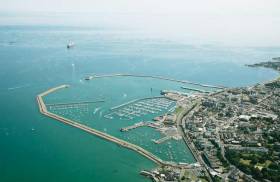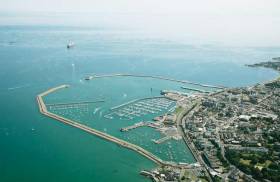Displaying items by tag: Michael Merrigan
Public Meeting On ‘People’s Harbour’ In Dun Laoghaire Later This Month
A public meeting on the future on Dun Laoghaire Harbour will take place at the Dun Laoghaire Club on Eblana Avenue from 8pm on Thursday 28 February.
‘The People’s Harbour’ was also the topic of a recent meeting between Dun Laoghiare-Rathdown councillors from Sinn Féin, Labour, People Before Profit and local independent Michael Merrigan.
The latter tabled a question at the 21 January meeting of the Dun Laoghaire Area Committee regarding contingency planning in the event of a no-deal Brexit.
“Residents have been contacting me with their concerns that in the event of Dun Laoghaire-Rathdown County Council being requested by the Government to make Dun Laoghaire Harbour available for ferry services, that we could have a return to big lorries coming through the town,” Cllr Merrigan commented earlier this month.
Dún Laoghaire - "The People's Harbour" - Public Meeting on the Future of the Harbour - Thursday 28th February 2019 at 20.00hrs, Dún Laoghaire Club, 3, Eblana Avenue, Dún Laoghaire. The Harbour was transferred to @dlrcc on 3 Oct. 2018. @DLRTourism @DublinGazette #PeoplesHarbour pic.twitter.com/d9VQo2h5dy
— Michael Merrigan ???? (@VoteMerrigan) February 12, 2019
Minister Confirms ‘All Assets & Liabilities’ Of Dun Laoghaire Harbour Company Will Transfer To Local Authority
#DLHarbour - “All assets and liabilities” of Dun Laoghaire Harbour Company will transfer to the local authority upon its pending dissolution — with no additional State funding available, the Minister for Transport has confirmed.
Shane Ross was responding in writing to a parliamentary question from local independent county councillor Michael Merrigan, which asked the minister to specify if any funding would be provided “to create a reserve to assist Dun Laoghaire-Rathdown County Council in outstanding liabilities as part of a final agreement of transfer”.
“National Ports Policy recognised that the future of Dun Laoghaire port lies in marine leisure, marine tourism, cultural amenity and urban redevelopment,” Minister Ross wrote. “In addition, it clearly states that there is no Exchequer finding for any port company.”
Dún Laoghaire Hbr. transfer to @dlrcc - reply to PQ on approx. €33.5 million burden on residents & businesses in county. @Shane_RossTD - Minister for Transport (AND Closed Garda Stations, Demolished Swimming Pools & Judicial Appointments) needs to clarify funding! pic.twitter.com/fqVGCA1B5H
— Michael Merrigan (@VoteMerrigan) April 18, 2018
Confirming that the existing port company’s assets and liabilities would transfer to DLRCoCo, the minister added that “the port will continue to generate income from marine-related and other activities such as rents, leases and car parks”, and that any remedial and engineering works “are normally prioritised” and funded via planned allocations.
Cllr Merrigan’s question raised concerns that Dun Laoghaire Harbour company’s financial liabilities “are greater than its liquid assets” and that the transfer comes with “risks and potential exposure” to the local authority.
The minister “needs to clarify funding” on the foot of a “€33.5 million burden on residents and businesses” in the county, the councillor added.
Last week, local Green Party councillor Ossian Smyth said the transfer of liabilities to the local authority is “not acceptable”.






























































